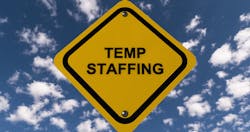A new law enacted by the state of New Jersey adopts new protections for temporary workers that places greater responsibility on the employers who use the staffing firms who hire them. The statute which goes into effect on Aug. 5 also is expected to be used as an example in the future by other states and jurisdictions in expanding the employment rights of these workers.
“In a possible harbinger for things to come nationwide—particularly in more worker-friendly states—New Jersey’s new law represents the most significant step yet that a state has taken to protect a segment of the workforce that is often overlooked by state law,” says attorney Andrew C. Karter of the Akerman law firm. “Employers who dispatch and/or use temporary workers in New Jersey and around the country should take note of this new law and growing trend.”
The new law imposes sweeping changes to compensation, benefits and legal protections for temporary workers. The temporary staffing agencies and employers that hire workers through such agencies will be responsible for bearing the cost and burden of future compliance with this expansive new law.
The law only covers temporary laborers who are dispatched by a temporary help service firm for certain job categories that are designated by the U.S. Department of Labor’s Bureau of Labor Statistics (BLS). These include transportation and material moving; building and grounds cleaning and maintenance; production; construction laborers, helpers and construction trade workers.
Others listed in the new law are personal care and service; food preparation and serving related occupations; other protective service workers; or any successor categories as the BLS may choose to designate in the future.
It requires that temp workers be given no less than the average rate of pay and average cost of benefits of third-party clients’ employees who perform the same or substantially similar work.
As a result, employers and staffing agencies must now determine which of their employees are in positions sufficiently similar to temp workers to determine their pay and benefits.
Temp staffing agencies cannot deduct from a worker’s wages items such as check-cashing fees or expenses for conducting consumer reports, background checks, or drug tests. Instead, these expenses must be borne by the employer or the staffing agency.
The staffing firms must provide temp workers with a detailed itemized statement on their paycheck stub or another approved form which lists the name, address and phone number of each client at which the temp laborer worked. Also included are the number of hours worked each day; rate of pay for each hour worked, including any premium rate or bonus; and the total pay period earnings. The same statement must include the amount and purpose of each deduction taken.
The covered temp workers who are placed at a third-party client’s worksite, but who are not utilized by the third-party client, still must be paid for a minimum of four hours by the temp staffing firm. However, if the firm is able to secure work for the laborer at another location during that same shift, then the firm is only required to pay for a minimum of two hours.
Temps also are protected under the law from last-minute work schedule changes and cancellations. In addition, if a temp worker’s schedule is changed during a multi-day assignment, firms must, to the extent possible, provide written notice of the change at least 48 hours in advance. A firm’s failure to do so will place them under a burden to show that providing notice was not possible.
Because of this, Karter recommends that a firm “remain in regular (if not daily) contact with a customer or third-party client, or at the very least, request that the customer or third-party client alert the firm to any changes prior to their institution.”
The new law also specifies that temp staffing firms are prohibited from restricting covered temp workers’ right to accept a permanent position with a third-party client to whom the laborer had been referred for work. Similarly, they cannot restrict a client from offering such employment. However, a firm may charge a placement fee under certain circumstances.
Temp agencies must be certified by the state labor department and certification requirements will be strengthened. Fines for violating the new law vary based on the type and number of prior violations and range from $500 to $5,000 for each individual violation.
About the Author

David Sparkman
founding editor
David Sparkman is founding editor of ACWI Advance (www.acwi.org), the newsletter of the American Chain of Warehouses Inc. He also heads David Sparkman Consulting, a Washington D.C. area public relations and communications firm. Prior to these he was director of industry relations for the International Warehouse Logistics Association. Sparkman has also been a freelance writer, specializing in logistics and freight transportation. He has served as vice president of communications for the American Moving and Storage Association, director of communications for the National Private Truck Council, and for two decades with American Trucking Associations on its weekly newspaper, Transport Topics.
